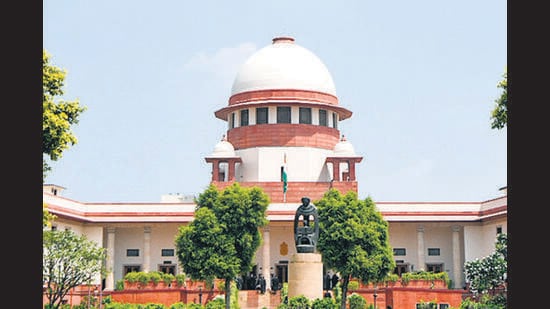Sikh Gurdwara Act: How Punjab’s stand changed with successive governments
“It was originally an intra-state legislation enacted by the state legislature, subsequently became an inter-state body only by virtue of the Punjab Reorganization Act, 1966” – Supreme Court
Politics, probably, was at play as successive regimes in Punjab took divergent stands before the Supreme Court on whether the Central government has the power to make law in respect of Shiromani Gurdwara Prabandhak Committee (SGPC), amend the Sikh Gurdwaras Act, 1925 and whether the 1925 Act was a central or state law.

Apex court on Sikh Gurdawara Act 1925
The apex court which on September 20 had upheld the validity of Haryana Sikh Gurdwara (Management) Act, 2014, dismissing the petition filed by SGPC, held that Sikh Gurdwara Act, 1925 was originally an intra-state legislation enacted by the state legislature and subsequently became an inter-state body only by virtue of the Punjab Reorganisation Act, 1966. Since the power to legislate conferred on the state legislature has not been affected in any manner, therefore, the state would have power to legislate both under entry 28 of the Concurrent list or entry 32 of state list in the seventh schedule to the Constitution for the reason that the 1925 Act is not an inter-state body corporate in respect of which the Parliament incorporated such Board, the apex court held.
Centre’s power to issue directions under reorganization Act a transitional provision
The top court said that the consistent view of the three full benches of the Punjab and Haryana high court and the SC is that the power of the Centre to issue directions under Section 72 of the Punjab Reorganization Act, 1966 is a transitional provision.
“Therefore, we have no hesitation to hold that the power of the Centre to issue directions under Section 72 of the 1966 Act is indeed a transitional provision to ensure smooth and continuous functioning of a body corporate so that it is not paralysed on becoming an inter-state body corporate due to reorganisation of the erstwhile state of Punjab. A competent state legislature is not deprived of its power to legislate on the subjects falling within its jurisdiction in terms of state list of the seventh schedule,’’ the SC said.
Punjab’s stand during SAD rule
The Punjab government under the then Chief Minister Parkash Singh Badal of the Shiromani Akali Dal (SAD) was quick to oppose the Haryana law soon after it was enacted in July 2014. The Haryana law was enacted by the Congress regime under Bhupinder Singh Hooda. The Punjab government in an August 24, 2014 reply filed before the SC stated that the power to make law in respect of SGPC as an inter-state body corporate has been reserved to the Central government only.
“The power to make law in respect of the SGPC as an inter-state body corporate has been reserved to the Central government only and there is no provision in law for bifurcation of the said inter-state body corporate or replacement thereof by enacting a state legislation,’’ the SAD-led Punjab government told the apex court.
It further said that thus in light of the submissions, it is clear that SGPC is firmly rooted as an inter-state body corporate and only Parliament is empowered to legislate regarding inter-state corporations as per Entry 44 of Union list of seventh schedule to the Constitution.
“The enactment of the Haryana Sikh Gurdwara (Management) Act, 2014 in purported exercise of legislative competence under entry 32 of State list is wholly unconstitutional and trespasses into a field exclusively reserved for Parliamentary legislation, in view of the statutory provisions referred above,” the Punjab government said in its August 2014 reply.
Punjab’s stance during the Congress rule
However, the Punjab government on November 22, 2019, during the Congress rule with Capt Amarinder Singh as the chief minister, took a divergent stand before the SC while filing an additional affidavit. It was stated that after the affidavits were filed at the initial stage, there have been subsequent developments when the Parliament enacted Sikh Gurdwara (Amendment) Act, 2016, amending Sections 49 and 92 of the Sikh Gurdwara Act, 1925 with retrospective effect from October 8, 2003. The amendment carried out by the Parliament was challenged in 2017 and is pending before the Punjab and Haryana high court.
Punjab under the Congress rule told the SC that the modification by the Central government in terms of Section 72(1) of the Punjab Reorganization Act, 1966 is in relation to functioning and operating of the body corporate, the SGPC. However, such power cannot be extended to amend the statute or issuance of notifications from time to time, it told the apex court.
“While Section 72(1) of 1966 law does indeed empower the Central government to modify, such power is confined to directions by the Central government in relation to the functioning and operating of such body corporate, the SGPC and cannot be extended to amending the statute. The issuance of such notifications from time to time do not change the legislative character of the Sikh Gurdwara Act, 1925 (from a state legislation) to that of a parliamentary legislation and it was conclusively held by the HC in the Sehajdari Sikh Federation versus Union of India,’’ Punjab said in its 2019 response.
“It is an undisputed fact that the Sikh Gurdwara Act, 1925 is an act of state legislature and was enacted for the administration of certain Sikh Gurdwaras in Punjab as it then existed and thereafter various amendments have been made to it by the Punjab legislature. It is only due to section 72 of the 1966 Act that the Board under the Sikh Gurdwara Act became an inter-state corporation, which was only a temporary measure until law is made by the competent legislature,’’ Punjab told the SC.




